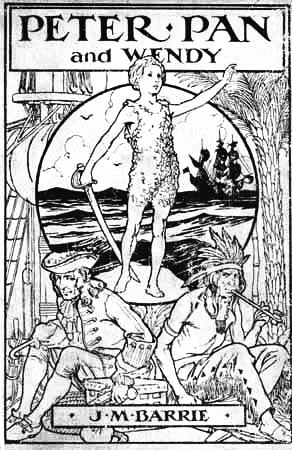Book Talk: Peter Pan by T.S. Barrie
 Sublime Character Development
Sublime Character DevelopmentI was reading this classic to the kids and found that I couldn't put it down. Peter Pan, written by Sir James Mathew Barrie in the 1800's is simply put, a stunning model for character development.
Rather than recap the story of Peter Pan, which so many of us know (and if you don't, for heaven's sake, go get a copy now), I wanted to explore the background of the writer in order to understand his brilliance (and secrets) when it came to character development.
Barrie was the son of a motherless daughter. His mother, Margaret, lost her own mother when she was eight years old. Margaret became fully responsible for her household at that time.
Barrie was born in Scotland and was the ninth child of ten. When he was six years old, his older brother died in an ice skating accident. The death was devastating to Margaret Barrie and to help compensate for her grief (and because he was the one home with her), Barrie would sometimes wear his dead brothers clothing. Eventually Barrie and his mother entertained each other with stories from her childhood and the sharing of adventure books like Robinson Caruso. Barrie learned to be a vivid storyteller—as a way to offer consolation to his mother. His mother took comfort in the fact that her dead son would remain a boy forever and this was the birth of the character of Peter Pan.
Educated at the University of Edinburgh, Barrie wrote drama reviews for a newspaper. Eventually he turned to the theatre and wrote plays.
When Barrie wrote Peter Pan, it was a stage production and therein lays the "ah-ha" for me. The character development on the pages is so deep and complete, it boggles the mind but when I consider how much an actors character much be created in advance in order for actors to fully enter the role—I understand.
But let me go a step past the obvious to see what, specifically, makes his character development so marvelous. (After all, many playwrights didn't take this kind of time delving deeply into characters, right?) For me, Barrie's brilliance is in the way he places each person on the page as a personality verses a physical being. Barrie goes beyond hair color and height and into persona—the essence of a person—dare I say "soul." Barrie gives his characters spectrum.
Mrs. Darling is written about thus: "She was a lovely lady, with a romantic mind and such a sweet mocking mouth. Her romantic mind was like the tiny boxes, one with the other, that comes from the puzzling East, however many you discover there is always one more; and her sweet mocking mouth had one kiss on it that Wendy could never get, thought there is was, perfectly conspicuous in the right-hand corner."
Mr. Darling: "Mr. Darling used to boast to Wendy that her mother not only loved him but respected him. He was one of those deep ones who know about stocks and shares. Of course no one really knows, but he quite seemed to know, and he often said stocks were up and shares were down in a way that would have made women respect him."
The two of them described: "Mrs. Darling loved to have everything just so, and Mr. Darling has a passion for being exactly like his neighbors; so of course, they have a nurse."
Peter Pan: "It is humiliating to have to confess that this conceit of Peter's was one of his most fascinating qualities. To put it with brutal frankness, there was never a cockier boy."
And one more. Hook! "In the midst of them, the blackest and largest jewel in that dark setting, reclined James Cook…In person he was cadaverous and blackavized, and his hair was dressed in long curls, which at a little distance looked like black candles, and gave a singularly threatening expression to his handsome countenance."
I'm sorry to write so many examples but the character sketches are simply enthralling. Consider that the book is only 143 pages long—wow. Barrie keeps describing his characters all the way to his ending—so the reader continues to have the depth of each person's being-ness throughout.
[image error] Why did I spend so much time looking at Barrie's beginnings? Well, as I look at his work critically, I felt his childhood was crucial. I don't want to analyze him but rather wanted to get at the depths of what makes him such a fine storyteller and character creator. He lived a soulful life—in a soulful connection to his mother as healer (or attempted healer) of her deep grief over the death of her son (his brother) which likely triggered her early pain from the death of her own mother and thus the death of her own childhood. It's the old adage: great depth comes from great heartbreak or what doesn't kill you makes you…a better storyteller.
Barrie pays attention to personality and even soul and to me, that is the basis of great story telling.
Published on October 03, 2011 09:00
No comments have been added yet.



